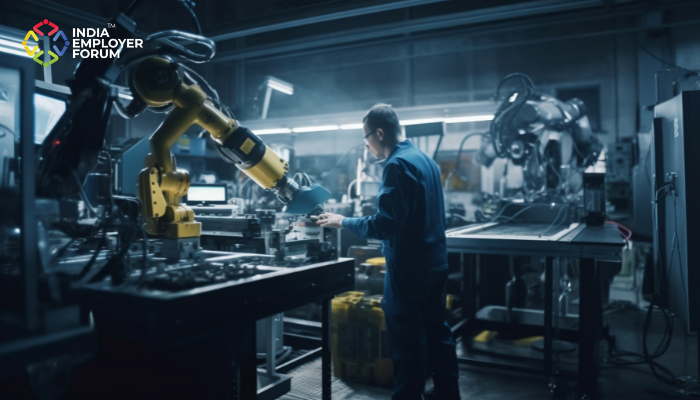The manufacturing industry has always been at the forefront of technological innovation, constantly evolving to meet the ever-increasing demands of consumers. In recent years, the pace of technological advancement has accelerated, with several new technologies set to transform the manufacturing industry in the next five years. In this article, we will explore some of the most significant technological changes in manufacturing that are set to revolutionise the industry.
Robotics and automation
Robotics and automation have been around for a while, but in the next five years, their impact on manufacturing will be significant. Advances in robotics and artificial intelligence will lead to the development of more sophisticated robots capable of performing complex tasks with greater precision and efficiency. Robots will be able to work alongside human workers, taking over repetitive and hazardous tasks, thereby reducing the risk of workplace accidents. Automation will also lead to greater efficiency in the manufacturing process, reducing costs, and improving productivity.
3D printing
3D printing, also known as additive manufacturing, has the potential to revolutionise the manufacturing industry. With 3D printing, manufacturers can produce complex and customised parts quickly and at a lower cost. This technology has been used to create everything from automotive parts to medical implants. In the next five years, 3D printing is expected to become more accessible, enabling small and medium-sized businesses to take advantage of this technology.
Internet of things (IoT)
The Internet of Things (IoT) is the interconnectivity of devices, machines, and systems over the Internet. In the manufacturing industry, IoT devices can be used to monitor and control various aspects of the production process. Sensors can be used to collect data on equipment performance, energy usage, and product quality. This data can be analysed to identify areas for improvement and optimise the manufacturing process. In the next five years, the IoT is expected to become more integrated into manufacturing operations, leading to increased efficiency, reduced downtime, and improved product quality.
Augmented reality (AR)
Augmented reality (AR) is the integration of digital information into the real world. In the manufacturing industry, AR can be used to provide workers with real-time information about the manufacturing process, enabling them to perform their jobs more efficiently and accurately. For example, AR glasses can be used to provide workers with instructions on how to assemble a product, reducing the risk of errors and improving productivity. In the next five years, AR is expected to become more prevalent in manufacturing operations, enabling workers to perform their jobs more effectively.
Artificial intelligence (AI)
Artificial intelligence (AI) is the simulation of human intelligence in machines. In the manufacturing industry, AI can be used to optimise the manufacturing process, reduce downtime, and improve product quality. Machine learning algorithms can be used to analyse data from sensors and other sources to identify patterns and make predictions. This information can be used to improve the efficiency of the manufacturing process and reduce waste. In the next five years, AI is expected to become more prevalent in manufacturing operations, leading to greater efficiency and productivity.
Blockchain
Blockchain is a decentralised digital ledger that enables secure and transparent transactions. In the manufacturing industry, blockchain can be used to create a secure and transparent supply chain. By recording every step of the manufacturing process on a blockchain, manufacturers can ensure that products are produced ethically and sustainably. This technology can also be used to trace the origin of products, ensuring that they are not counterfeit or unsafe. In the next five years, blockchain is expected to become more prevalent in manufacturing operations, leading to greater transparency and accountability in the supply chain.
Quantum computing
Quantum computing is a new form of computing that uses quantum-mechanical phenomena, such as superposition and entanglement, to perform operations. In the manufacturing industry, quantum computing can be used to simulate complex processes and optimise manufacturing operations. For example, quantum computing can be used to optimise supply chain logistics, reducing delivery times and costs. In the next five years, quantum computing is expected to become more prevalent in manufacturing operations, enabling manufacturers to tackle complex problems and make more accurate predictions.
Cloud computing
Cloud computing refers to the delivery of computing services, such as storage, processing, and applications, over the Internet. In the manufacturing industry, cloud computing can be used to store and manage vast amounts of data from sensors and other sources. Manufacturers can use this data to monitor and optimise the manufacturing process, reducing downtime and improving productivity. In the next five years, cloud computing is expected to become more prevalent in manufacturing operations, enabling manufacturers to store and manage data more efficiently and cost-effectively.
Cybersecurity
As manufacturing becomes more reliant on technology, cybersecurity will become increasingly important. Manufacturers will need to protect their networks, devices, and data from cyber-attacks. This will require a comprehensive cybersecurity strategy that includes measures such as firewalls, encryption, and employee training. In the next five years, cybersecurity will become a top priority for manufacturers, as they seek to protect their operations and their customers’ data.
Sustainable manufacturing
Sustainability has become a major concern for consumers, and manufacturers are taking notice. In the next five years, manufacturers will increasingly adopt sustainable manufacturing practices, such as using renewable energy sources, reducing waste, and recycling materials. This will not only help to reduce the environmental impact of manufacturing but also improve the bottom line by reducing costs and improving efficiency.
In conclusion, the manufacturing industry is on the cusp of significant technological changes that will transform the industry in the next five years. Robotics and automation, 3D printing, the IoT, AR, AI, blockchain, quantum computing, cloud computing, cybersecurity, and sustainable manufacturing are all set to play a significant role in the future of manufacturing. Manufacturers that embrace these technologies will be able to improve efficiency, reduce costs, and enhance product quality, giving them a competitive advantage in the global marketplace. As the pace of technological changes in manufacturing continues to accelerate, it is essential for manufacturers to stay ahead of the curve and embrace these changes to remain relevant and competitive in the years to come.
Reference: Technological changes that will transform manufacturing in the next 5 years | Time of India | April 2023
You might also be interested to read:Digital Competence: Essential Skills for Teachers of Higher Education






